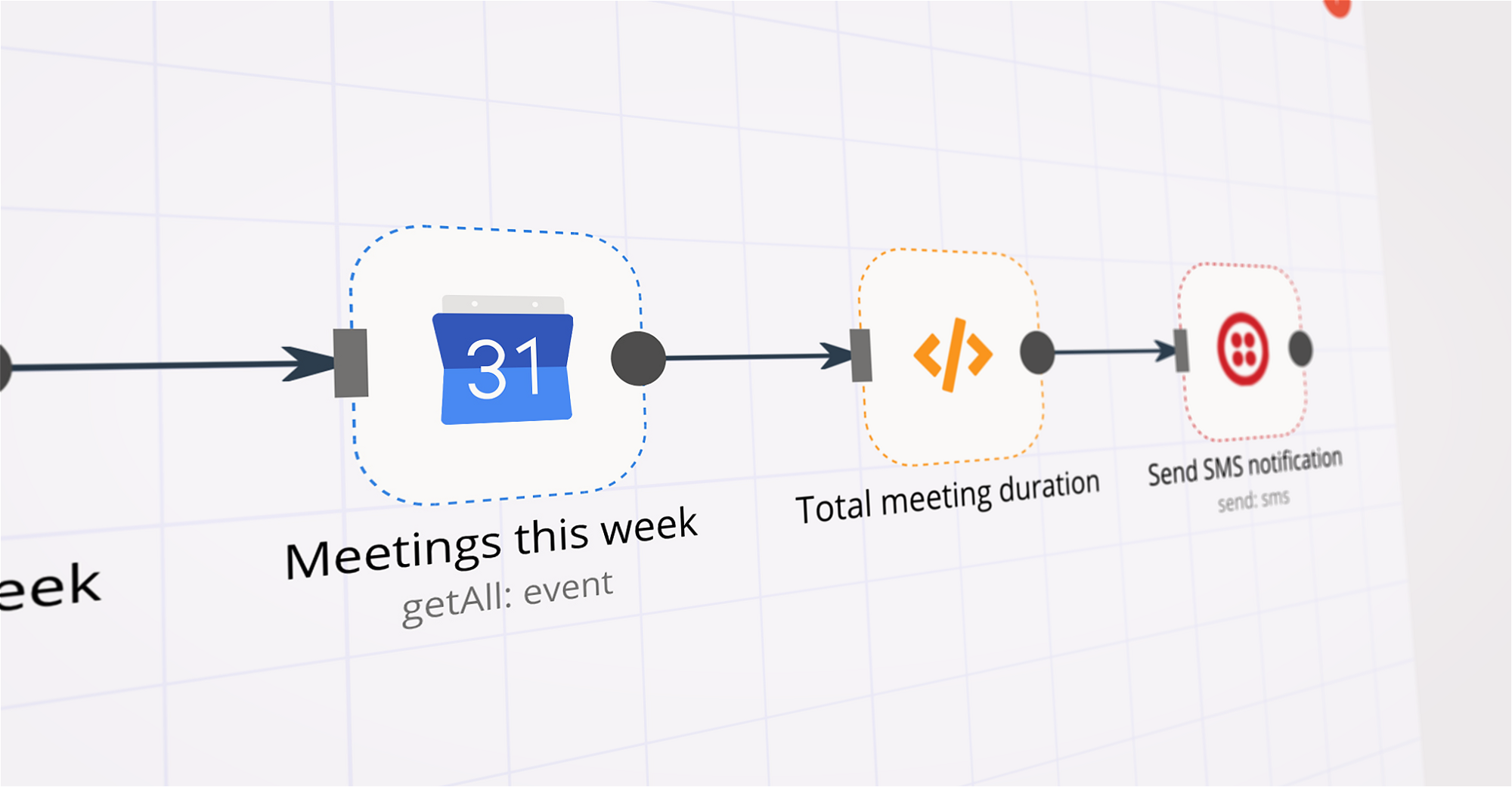Google Calendar and HTTP Request integration
Save yourself the work of writing custom integrations for Google Calendar and HTTP Request and use n8n instead. Build adaptable and scalable Productivity, workflows that work with your technology stack. All within a building experience you will love.
How to connect Google Calendar and HTTP Request
Create a new workflow and add the first step
In n8n, click the "Add workflow" button in the Workflows tab to create a new workflow. Add the starting point – a trigger on when your workflow should run: an app event, a schedule, a webhook call, another workflow, an AI chat, or a manual trigger. Sometimes, the HTTP Request node might already serve as your starting point.
Popular ways to use the Google Calendar and HTTP Request integration
Scrape recent news about a company before a call
Actioning your meeting next steps using transcripts and AI
Build a chatbot, voice and phone agent with Voiceflow, Google Calendar and RAG
Build an AI powered phone agent 📞🤖 with Retell, Google Calendar and RAG
AI Timesheet Generator with Gmail, Calendar & GitHub to Google Sheets
Explore n8n nodes in a visual reference library
Build your own Google Calendar and HTTP Request integration
Create custom Google Calendar and HTTP Request workflows by choosing triggers and actions. Nodes come with global operations and settings, as well as app-specific parameters that can be configured. You can also use the HTTP Request node to query data from any app or service with a REST API.
Google Calendar supported actions
Availability
If a time-slot is available in a calendar
Create
Add a event to calendar
Delete
Delete an event
Get
Retrieve an event
Get Many
Retrieve many events from a calendar
Update
Update an event
Google Calendar and HTTP Request integration details
Google Calendar
Google Calendar is a time-management and calendar service created by Google Workspace. It helps you schedule and organize events and meetings, send notifications, and synchronize with your team. It is widely used by both individuals and organizations.
Related categories
HTTP Request
Related categories
Google Calendar and HTTP Request integration tutorials

15 Google apps you can combine and automate to increase productivity
Learn how to combine and automate popular Google apps for more productivity in the workplace.

Tracking time spent in meetings with Google Calendar, Twilio, and n8n
Learn about automating the process of calculating your meeting time every week to give you a better idea on how your week is spent.
FAQ
Can Google Calendar connect with HTTP Request?
Can I use Google Calendar’s API with n8n?
Can I use HTTP Request’s API with n8n?
Is n8n secure for integrating Google Calendar and HTTP Request?
How to get started with Google Calendar and HTTP Request integration in n8n.io?
Need help setting up your Google Calendar and HTTP Request integration?
Discover our latest community's recommendations and join the discussions about Google Calendar and HTTP Request integration.

Google Calendar free/busy times output is confusing the AI sometimes
jake chard
Hi all! I’m currently using this workflow to suggest 2 available times in a google calendar. Currently I am just using the straight output from calendar node in the AI response, it gives the AI busy times. (Here are t…
Open topic

Google Verification Denied
Moiz Contractor
Describe the problem/error/question Hi, I am getting a - Google hasnt verified this app error. I have Enable the API, the domain is verified on the Cloud Console, the user is added in the search console and the google do…
Open topic

HTTP request, "impersonate a user" dynamic usage error
theo
Describe the problem/error/question I a http request node, I use a Google service account API credential type. I need the “Impersonate a User” field to be dynamic, pulling data from the “email” field in the previous nod…
Open topic

Why is my code getting executed twice?
Jon
Describe the problem/error/question I have a simple workflow that retrieves an image from url with http node and prints the json/binary in code. I have a few logs, but I am confused why I see duplicate messages for each …
Open topic

How to send a single API request with one HTTP node execution, but an array of parameters in it (like emails[all]?)?
Dan Burykin
Hi! I’m still in the beginning. Now I need to make an API call via HTTP node, and send all static parameters, but with the array of emails parameter (named it wrongly just to show what I need {{ $json.email[all] }}). Wo…
Open topic
Looking to integrate Google Calendar and HTTP Request in your company?
The world's most popular workflow automation platform for technical teams including
Why use n8n to integrate Google Calendar with HTTP Request
Build complex workflows, really fast


